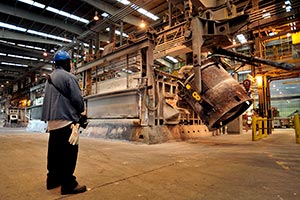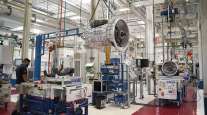Manufacturing Growth Cooled in July From One-Year High

U.S. manufacturing expanded in July, though at a slower pace, indicating gradual improvement that could help the economy emerge from a weak first half of the year.
The Institute for Supply Management’s index cooled to 52.6 from a one-year high of 53.2 a month earlier, the Tempe, Arizona-based group’s report showed Aug. 1. Readings above 50 indicate growth. The median forecast in a Bloomberg News survey of economists was 53.
Factories cut back on employment even as orders and production remained strong last month, indicating producers are focused on cost-cutting as the economy struggles to gain speed. Stronger consumer spending is helping to limit the effects of weaker global demand and cutbacks in corporate investment.
“Business leaders remain cautious — they have to stay on top of this ever-changing operating backdrop,” Sam Bullard, a senior economist at Wells Fargo Securities in Charlotte, North Carolina, said before the report. “Firms aren’t about to ramp up investment and hiring in this environment.”
Estimates for the manufacturing index in the Bloomberg survey ranged from 51.1 to 54.
The ISM’s gauge of new orders was little changed at 56.9 last month after 57 in June. A measure of production picked up to 55.4 from 54.7.
The employment index decreased to 49.4 in July from 50.4 a month earlier, contracting for the seventh time in the past eight months.
The report also showed factory inventories shrank in July, while prices climbed at a slower pace.
Overseas economies have been treading water, limiting demand for American merchandise. While a government measure of manufacturing in China contracted, private gauges showed growth in July.
Euro-area manufacturing slowed in July as uncertainty after Britain’s vote to leave the European Union damped orders, according to Markit Economics.
A jobs report due Friday from the U.S. Labor Department is projected to show payrolls rose 175,000, in line with the 172,000 monthly average so far in 2016, according to the median estimate in a Bloomberg survey.
Federal Reserve policymakers said that the U.S. benchmark interest rate would remain unchanged at least until their next meeting in September. The officials are still in a wait-and-see mode as they look for further progress on inflation, employment and global growth prospects.
The Fed meeting took place ahead of the Commerce Department’s report July 29 that showed gross domestic product rose at a 1.2% annualized rate after a 0.8% advance the prior quarter.



